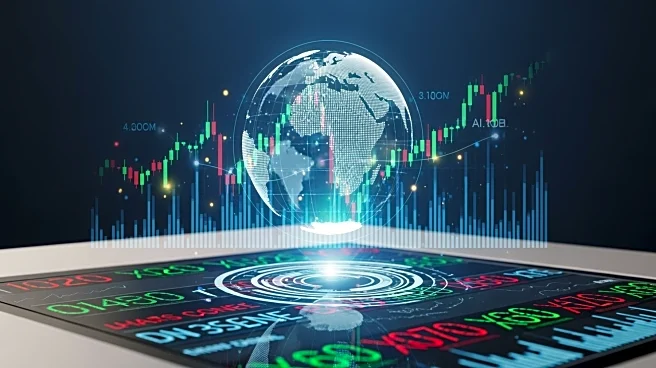What's Happening?
Concerns are rising among investors and analysts about a potential bubble in the AI sector, reminiscent of the dot-com boom and bust. The debate centers around whether the current high valuations of AI-driven companies are sustainable. Steve Russolillo,
Business Insider's chief news editor, expresses worry that the AI bubble could grow and eventually burst more dramatically than past market bubbles. The Shiller P/E ratio, a traditional valuation indicator, is at a high level, suggesting potential market instability. Despite these concerns, some argue that the companies leading the AI revolution, such as Nvidia, Microsoft, and Amazon, are fundamentally stronger than those during the dot-com era, with better cash flow and profitability.
Why It's Important?
The potential AI bubble has significant implications for the U.S. economy and stock market. If the bubble bursts, it could lead to substantial financial losses for investors and impact the broader economy. The dominance of major tech companies in the stock market, with the 'Mag 7' stocks comprising over one-third of the S&P 500, poses a concentration risk. A downturn in any of these companies could rapidly affect the market. Additionally, the circular nature of AI deals raises questions about their long-term sustainability and economic returns, which could influence future investment strategies and market stability.
What's Next?
Investors and analysts will continue to monitor the AI sector closely for signs of a bubble. The debate over the sustainability of current valuations and the economic return of AI investments is likely to persist. Companies involved in AI, such as OpenAI, Oracle, and CoreWeave, may face increased scrutiny regarding their financial health and reliance on AI-driven deals. The market's response to these concerns could shape future investment trends and regulatory actions in the tech industry.
Beyond the Headlines
The discussion around an AI bubble highlights broader issues in the tech industry, including the ethical and economic implications of rapid technological advancements. The concentration of market power among a few major companies raises questions about competition and innovation. Additionally, the reliance on AI-driven metrics and valuations may prompt a reevaluation of traditional financial indicators and investment strategies.














